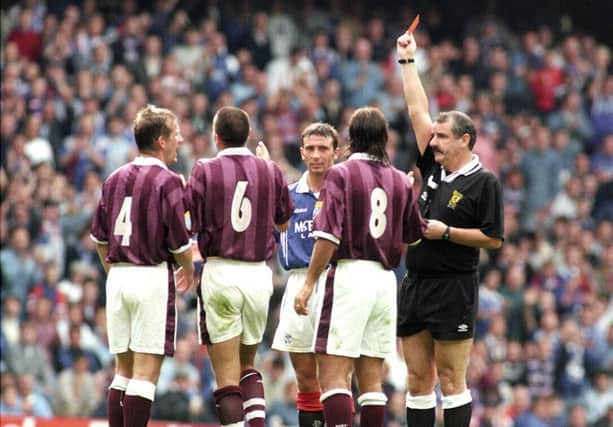Remembering when Hearts had four men sent off against Rangers at Ibrox


Stephen Finnie showed red to both Esmael Goncalves and Kirk Broadfoot in Kilmarnock’s loss to Hearts, John Beaton sent Ryan Jack packing in Hibs’ victory at Ibrox (though he actually should have done so with another), and Craig Thomson banished three Motherwell stars during the Fir Park side’s 4-1 loss at St Johnstone.
Advertisement
Hide AdAdvertisement
Hide AdIt brought up the usual debates of refereeing standards in Scotland, with a Rangers’ fans group going as far as to call for a stop to “anti-Rangers refereeing” in an online petition.
Whether ‘Red Card Saturday’ enters the Scottish football lexicon remains to be seen, but the combined actions of Beaton and Thomson at least brought back memories of a truly bizarre moment in Scottish football history. One which still gets mentioned over 20 years later.
The day started innocently enough. Hearts, looking to kick-start an inconsistent opening four games to the 1996/97 season, travelled to a Rangers side hoping to keep up a 100 per cent record in their hope of capturing nine-in-a-row.
The visitors had a couple of early opportunities before Rangers cranked up the pressure and led 1-0 at half-time. A minute into the second period Pasquale Bruno saw red for a second booking, which in itself wasn’t particularly unusual. Even in his short time in Scotland, the fiery Italian wasn’t a stranger to officials. The latest infraction put his team at a serious disadvantage, which Rangers capitalised on when Paul Gascoigne doubled their lead, effectively ending Hearts’ chances.
Then Mr Gerry Evans took centre stage.
In the spell of seven incredible second half minutes, the referee produced not one, not two, but three additional red cards, leaving Hearts to play the final 23 minutes with seven men.
It was a showing so bizarre that even Richard Gough pleaded with the officials to reconsider the fourth dismissal as the game had long spiralled into a farce, with the home crowd also voicing their displeasure.
Some pundits and writers defended the officials by breaking down the individual incidents, which if looked at in isolation, could each be argued as the correct decision.
Bruno red - He was already on a booking, and deservedly so, when he hauled down Gordon Durie on a Rangers’ counter attack.
Advertisement
Hide AdAdvertisement
Hide AdWeir red - Similar to the Ryan Jack red from this past weekend, he thrusted his head toward Durie when the pair squared up to each other.
Pointon red - Kicking the post seems like a ridiculous reason to book a player, but it was looked upon as an expression of dissent. It’s the same when a player bounces the ball in anger after a contentious decision. It’s not the act itself, but the context. Pointon screamed at linesman Graeme Allison after kicking the post and, like Bruno, was on a yellow card at time.
Ritchie red - This was supposedly for foul and abusive language, which, if bad enough, can merit a red card.
Context is the key word here. Yes, each of those decisions in a vacuum could be construed as worthy of an ordering off. But no referee should let it get to this point. Not when at least two of the instances didn’t necessarily merit a red card. They have to keep themselves out of the headlines and the game within their control.
This writer once spoke to John McKendrick, spokesman for the referee’s union, about the abuse referees face in each and every game. The whistler stressed that, although referees deserve more empathy for their mistakes, players deserve empathy too. The example he gave was a team fighting against relegation. In such instances, players can be quick and vehement with their tongue, given the pressures of the situation. Referees would do well to turn the other cheek, rather than flashing cards left, right and centre, heightening the tension further. The same should have applied to this scenario.
In fairness to Mr Evans, he wasn’t the only one who would lose his head.
After the fourth red had been issued, Hearts chief executive Chris Robinson appeared at the side of the pitch, calling for his team’s players to walk off in protest. In a spot of role-reversal, manager Jim Jefferies vetoed the demand, citing monetary concerns if Hearts failed to see out the remainder of the game. Jefferies kept his players on the park, and was relieved to see them lose only one more goal in a 3-0 defeat - ironically the exact result which would have been awarded had another man been sent off, forcing an abandonment.
Jefferies told the Daily Record in 2015: “There was no shame in the result because it came from the worst refereeing display I’ve ever seen. Evans lost the plot and his decisions that day were ridiculous, just ludicrous. He retired that season.
Advertisement
Hide AdAdvertisement
Hide Ad“As for Mr Allison I used to bump into him occasionally in Dumfries and would always ask, ‘How can you send a player off for fouling a post?’”
Incredibly, the tale has a happy ending for Hearts. The following midweek Hearts faced Celtic in the League Cup at Tynecastle. With Gary Locke and Craig Levein two long-term injury casualties, Hearts were without six first-choice defenders, and yet a patchwork unit (including journeyman Andy Thorn and a young Gary Naysmith) kept a clean sheet over 120 minutes against Tommy Burns’ side in a famous 1-0 win.
